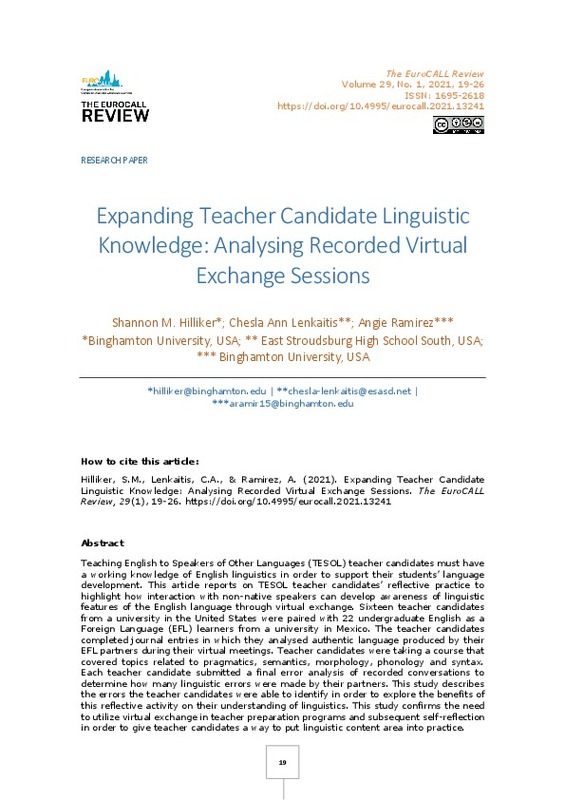Bohinski, C. A., & Leventhal, Y. (2015). Rethinking the ICC framework: Transformation and telecollaboration. Foreign Language Annals, 48(3), 521-534. https://doi.org/10.1111/flan.12149.
Ellis, E. (2003). Bilingualism among teachers of ESL. A study of second language learning experience as a contributor to the professional knowledge and beliefs of teachers of ESL to adults (Unpublished doctoral dissertation). Brisbane, Griffith University.
Ellis, E.M. (2004). The invisible multilingual teacher: The contribution of language background to Australian ESL teachers' professional knowledge and beliefs. International Journal of Multilingualism, 1(2), 90-108. https://doi.org/10.1080/14790710408668181
[+]
Bohinski, C. A., & Leventhal, Y. (2015). Rethinking the ICC framework: Transformation and telecollaboration. Foreign Language Annals, 48(3), 521-534. https://doi.org/10.1111/flan.12149.
Ellis, E. (2003). Bilingualism among teachers of ESL. A study of second language learning experience as a contributor to the professional knowledge and beliefs of teachers of ESL to adults (Unpublished doctoral dissertation). Brisbane, Griffith University.
Ellis, E.M. (2004). The invisible multilingual teacher: The contribution of language background to Australian ESL teachers' professional knowledge and beliefs. International Journal of Multilingualism, 1(2), 90-108. https://doi.org/10.1080/14790710408668181
Erasmus (2019). What is Virtual Exchange? Retrieved from https://evolve-erasmus.eu/about-evolve/what-is-virtual-exchange/
Hawkins, E. (1999). Foreign language study and language awareness. Language Awareness, 8(3&4), 124-142. https://doi.org/10.1080/09658419908667124
Hilliker, S. M., Lenkaitis, C. A., & Bouhafa, Y. (2020). The role of intercultural virtual exchanges in developing pragmatic awareness. In C-C. Lin & C. Zaccarini (Eds.). Internationalization in Action: Leveraging Diversity and Inclusion in Globalized Classrooms. Bern, Switzerland: Peter Lang.
Hsu, L. (2016). Examining EFL teachers' technological pedagogical content knowledge and the adoption of mobile-assisted language learning: A partial least square approach. Computer Assisted Language Learning, 29(8), 1287-1297. https://doi.org/10.1080/09588221.2016.1278024
Ito, K. & Hilliker, S. (2018). Supporting University International Students Through Supportive ESL Instruction and Corrective Feedback. In B. Blummer, J. Kenton, and M. Wiatrowski (Eds). Promoting Ethnic Diversity and Multiculturalism in Higher Education (pp. 40-58). Hershey, PA: IGI Global. https://doi.org/10.4018/978-1-5225-4097-7.ch003
Lenkaitis, C. A. (2019). Rethinking virtual exchange: Partnering EFL learners with TESOL teacher candidates. NYS TESOL Journal, Special Issue on the Role of SLA in Teaching and Learning, 6(2), 3-15. http://journal.nystesol.org
Lenkaitis, C. A. (2020). Teacher candidate reflection: Benefits of using a synchronous computer-mediated communication-based virtual exchange. Teaching and Teacher Education, 92. https://doi.org/10.1016/j.tate.2020.103041
Lenkaitis, C. A., & Hilliker, S. (2019). Building a community of practice: Authentic practice through games. In C. A. Lenkaitis & S. M. Hilliker (Eds.), Engaging teacher candidates and language learners with authentic practice (p. 1-14). IGI Global. https://doi.org/10.4018/978-1-5225-8543-5.ch001
Lenkaitis, C. A., Calo, S., & Venegas Escobar, S. (2019). Exploring the intersection of language and culture via telecollaboration: Utilizing Zoom for intercultural competence development. International Multilingual Research Journal, 13(2), 102-115. https://doi.org/10.1080/19313152.2019.1570772
Lenkaitis, C. A., Loranc-Paszylk, B., & Hilliker, S. (2019). Global awareness and global identity development among foreign language learners: The impact of virtual exchanges. MEXTESOL Journal, 43(4), 1-11. http://mextesol.net/journal/
Loranc‐Paszylk, B, Hilliker, S.M, Lenkaitis, C.A. (2021). Virtual exchanges in language teacher education: Facilitating reflection on teaching practice through the use of video. TESOL J. https://doi.org/10.1002/tesj.580
Lucas, T., & Villegas, A. M. (2010). The missing piece in teacher education: The preparation of linguistically responsive teachers. National Society for the Study of Education, 109(2), 297-318. Retrieved from https://www.researchgate.net/profile/T_Lucas2/publication/292697945_The_missing_piece_in_teacher_education_The_preparation_of_linguistically_responsive_teachers/links/57444c7008aea45ee84f157b/The-missing-piece-in-teacher-education-The-preparation-of-linguistically-responsive-teachers.pdf
O'Dowd, R. (2017). Exploring the impact of telecollaboration in initial teacher education: The EVALUATE project. The EuroCALL Review, 25(2), 38-41. Retrieved from https://polipapers.upv.es/index.php/eurocall/article/view/7636/9679
Shulman, L.S. (1981). Disciplines of inquiry in education: An overview. Educational Researcher, 10(6), 5-12, 23. Retrieved from https://journals.sagepub.com/doi/pdf/10.3102/0013189X010006005
Shulman, L. S. (2013). Those who understand: Knowledge growth in teaching. Educational Researcher, 15(2), 4-31. Retrieved from https://journals.sagepub.com/doi/pdf/10.1177/002205741319300302
Swain, M. (1985). Communicative competence: Some roles of comprehensible input and comprehensible output in its development. In S. Gass & C. Madden (Eds)., Input in second language acquisition (pp. 235-253). Rowley, MA: Newbury House.
TESOL International Association (2018). Standards for initial TESOL Pre-K-12 teacher preparation programs. Retrieved from https://www.tesol.org/advance-the-field/standards/tesol-caep-standards-for-p-12-teacher-education-programs
Thirunarayanan, M. O. & Coccaro-Pons, J. (2016). A global information exchange (GIE) project in a graduate course. TechTrends, 60(3), 289-298. https://doi.org/10.1007/s11528-016-0051-6
[-]









